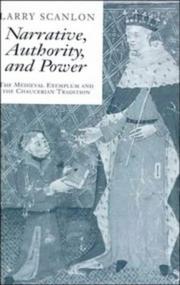| Listing 1 - 1 of 1 |
Sort by
|

ISBN: 0521432103 0521044251 0511553013 9780521044257 9780511553011 9780521432108 Year: 1994 Volume: 20 Publisher: Cambridge : Cambridge University Press,
Abstract | Keywords | Export | Availability | Bookmark
 Loading...
Loading...Choose an application
- Reference Manager
- EndNote
- RefWorks (Direct export to RefWorks)
Little attention has been paid to the political and ideological significance of the exemplum, a brief narrative form used to illustrate a moral. Through a study of four major works in the Chaucerian tradition (The Canterbury Tales, John Gower's Confessio Amantis, Thomas Hoccleve's Regement of Princes, and Lydgate's Fall of Princes), Scanlon redefines the exemplum as a 'narrative enactment of cultural authority'. He traces its development through the two strands of the medieval Latin tradition which the Chaucerians appropriate: the sermon exemplum, and the public exemplum of the Mirrors of Princes. In so doing, he reveals how Chaucer and his successors used these two forms of exemplum to explore the differences between clerical authority and lay power, and to establish the moral and cultural authority of their emergent vernacular tradition.
Authority in literature --- Autorité dans la littérature --- Gezag in de literatuur --- Influence (Literary, artistic, etc.) --- Influence littéraire, artistique, etc. --- Invloed (Literaire, artistieke, enz.) --- Macht (Sociale wetenschappen) in de literatuur --- Medieval rhetoric --- Middeleeuwse retorica --- Narration (Rhetoric) --- Narration (Rhétorique) --- Narrative writing --- Pouvoir (Sciences sociales) dans la littérature --- Power (Social sciences) in literature --- Retorica [Middeleeuwse ] --- Rhetoric [Medieval ] --- Rhétorique médiévale --- Verhaal (Retoriek) --- English poetry --- -Exempla --- -Influence (Literary, artistic, etc.) --- Rhetoric, Medieval --- Didactic literature, Latin (Medieval and modern) --- Latin didactic literature, Medieval and modern --- Latin literature, Medieval and modern --- Narrative (Rhetoric) --- Rhetoric --- Discourse analysis, Narrative --- Narratees (Rhetoric) --- Artistic impact --- Artistic influence --- Impact (Literary, artistic, etc.) --- Literary impact --- Literary influence --- Literary tradition --- Tradition (Literature) --- Art --- Influence (Psychology) --- Literature --- Intermediality --- Intertextuality --- Originality in literature --- Anecdotes --- Didactic literature --- Homiletical illustrations --- Example --- English literature --- History and criticism --- Chaucer, Geoffrey --- -Knowledge --- -Literature --- Power (Social sciences) in literature. --- Authority in literature. --- Exempla in literature. --- Rhetoric, Medieval. --- History and criticism. --- History --- Chaucer, Geoffrey, --- Knowledge --- Literature. --- Exempla in literature --- Chaucer, Jeffrey, --- Chʻiao-sou, Chieh-fu-lei, --- Chieh-fu-lei Chʻiao-sou, --- Choser, Dzheffri, --- Choser, Zheoffreĭ, --- Cosvr, Jvoffrvi, --- Tishūsar, Zhiyūfrī, --- Middle English, 1100-1500 --- Didactic literature [Latin ] (Medieval and modern) --- England --- Exempla --- English poetry - Middle English, 1100-1500 - History and criticism. --- Didactic literature, Latin (Medieval and modern) - England - History and criticism. --- Exempla - History and criticism. --- Arts and Humanities --- Poésie anglaise --- Contes --- Chaucer, Geoffrey - influence exercée
| Listing 1 - 1 of 1 |
Sort by
|

 Search
Search Feedback
Feedback About UniCat
About UniCat  Help
Help News
News